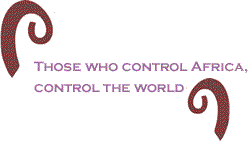This
is the first of a two-part article on the origin and development
of African Liberation Day (ALD) (click
here
to read Part II).
The celebration of African Liberation Day in the United States began in May 1972 in Washington, D.C. More than
60,000 people participated in this historic event.
In
1973, ALD was decentralized and Chicago
sponsored its first ALD celebration in May of that year.
Since that time, we have celebrated ALD in various ways,
with parades, rallies, and cultural programs.
From
the 1980s through 1997, the NBUF Chicago Chapter sponsored
African Liberation Day / ALD on the Westside, where we
marched down Madison
Street and culminated with a rally and cultural program
in Garfield
Park. These ALD events have been
very successful and we have been honored to sponsor them.
Other groups are now sponsoring African Liberation Day
celebrations and activities throughout the United
States.
African
Liberation Day has become an institution throughout the
African world. It is a day when all people of African
ancestry should come together. Whether you were born in
Ghana, Nigeria, Liberia, Kenya, Ethiopia, South Africa,
Mozambique, Zimbabwe, Haiti, Jamaica, Mississippi, Alabama,
Georgia, Belize, Bahia, Canada, Cuba, Trinidad, Puerto
Rico, Paris, or Chicago, as long as you are Black, you
are an African, with a common heritage, and a common set
of conditions.

As
we prepare to participate in the upcoming weekend of events
and activities, we must always remember the origin and
development of African Liberation Day. Our ancestor, Kwame
Ture, explained, �ALD was founded by Kwame Nkrumah on
the occasion of the First Conference of Independent States
held in Accra, Ghana and attended by eight independent
states. The 15th of April was declared African Freedom
Day to mark each year, the onward process of the liberation
movement, and to symbolize the determination of the people
of Africa to free themselves from
foreign domination and exploitation.�
Further,
the AAPRP (All-African People�s Revolutionary Party) points
out:
�On
the 25th of May 1963, 31 African heads of state convened
a summit meeting to found the Organization of African
Unity. They proclaimed May 25th as ALD and called for
mass demonstrations and manifestations in every comer
of Africa and the African Diaspora.�
The
idea of ALD has its origins in the long history of African
people, to break free of the yoke of European domination
and white supremacy. This is a time in which we emphasize
our oneness as a people with a common past, common set
of problems, and a common future.

The
capturing of millions of African people, who were placed
in slavery and introduced into the western hemisphere
as property and commodities, is the backdrop upon which
we commemorate African Liberation Day.
It
was the slave trade industry of the fifteenth, sixteenth,
and seventeenth-centuries involving Britain, France, Portugal,
Spain, Belgium, and Germany that served as the foundation
for these western powers and provided them the margin
of profit in getting the greatest return from their investment.
The western world still seeks to keep Africa
and African people worldwide in bondage, so they can continue
to maximize the greatest return from their initial investment.
After
chattel slavery was abolished in England
and the United
States, the slave trade industry
began to wind down. The former slave-trading nations found
themselves no longer needing slaves, but yet stumbled
upon the other natural resources of Africa.
They began to fight each other over the gold, diamonds,
and other mineral and plant resources they were discovering.
This
resulted in the calling of the Berlin Conference in 1884,
where the European powers united to divide the continent
of Africa among themselves. It has
been discussed, historically, that those who control Africa,
control the world. Therefore, the Berlin Conference was
a crowning blow in African history. The results of this
conference led to the carving up of Africa so that France, Britain,
Portugal,
Spain, Belgium,
and Germany
controlled separate territories throughout the continent.
This became known as the colonial period in African history.
The colonial period in Africa, just as the enslavement
of African people captured and brought to North America,
had a devastating impact on Africa
and African people. It was not until the early 1950s that
the first African country gained political independence
in the movement to reclaim Africa.
That country was Ghana,
under the leadership of Kwame Nkrumah, who led the Ghanaian
people in their fight against British colonialism.
I
will continue the discussion of the origin and development
of African Liberation Day in my next column. Many groups
around the country and the world where African people
reside will be hosting ALD Celebrations this year. Don�t
forget to support African Liberation Day activities in
your area of the world.

BlackCommentator.com
Columnist, Conrad W. Worrill, PhD, is the National Chairman Emeritus
of the National Black United Front (NBUF). Click
here
to contact Dr. Worrill.

